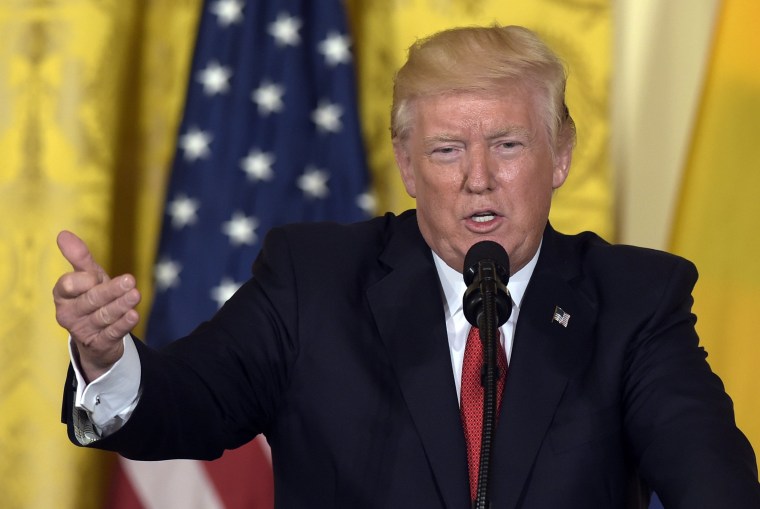On Friday afternoon, Donald Trump hosted a relatively brief press conference with Romania's Klaus Iohannis, and the two presidents were asked if they discussed the visa waiver program for Romania. Trump quickly responded, "We didn't discuss it. We didn't discuss it."
A couple of seconds later, Iohannis, who has his own domestic politics to consider, said the opposite, telling reporters that they did discuss it: Iohannis brought up the issue during his White House meeting, Trump's denial moments earlier notwithstanding.
In other words, the American president wasn't telling the truth -- which, when it comes to Donald J. Trump, is a familiar problem.
All of this came to mind yesterday, when former U.S. Attorney Preet Bharara, in his first television interview since being fired without explanation by the president, sat down with ABC News' George Stephanopoulos, who asked for Bharara's prosecutorial perspective: when it comes to the competing version of events between Trump and former FBI Director James Comey, "what gets this beyond a 'he said/he said' case?" Bharara replied:
"[Y]ou have this in court all the time. And look at the surrounding circumstances and the indicia of truthfulness and those things include contemporaneous statements to other people. They include the track record of the witness. They include whether or not one of the 'hes' in the 'he said/he said' has a track record for lying or not both on the air and in legal proceedings like depositions, and I believe there is such a track record with respect to one of the parties."
The former federal prosecutor didn't come right out and say, "The president has earned a reputation for brazen lying," but I think the point was nevertheless quite clear.
The "track record" is, after all, unambiguous and lengthy. The Washington Post, for example, reported the other day on a sworn deposition Trump gave in 2007, when he was confronted with a series of public falsehoods:
For two straight days, they asked Trump question after question that touched on the same theme: Trump's honesty.The lawyers confronted the mogul with his past statements — and with his company's internal documents, which often showed those statements had been incorrect or invented. The lawyers were relentless. Trump, the bigger-than-life mogul, was vulnerable — cornered, out-prepared and under oath.Thirty times, they caught him. Trump had misstated sales at his condo buildings. Inflated the price of membership at one of his golf clubs. Overstated the depth of his past debts and the number of his employees.That deposition — 170 transcribed pages — offers extraordinary insights into Trump's relationship with the truth. Trump's falsehoods were unstrategic — needless, highly specific, easy to disprove. When caught, Trump sometimes blamed others for the error or explained that the untrue thing really was true, in his mind, because he saw the situation more positively than others did.
During his sworn testimony last week, Comey was asked why he prepared contemporaneous memos on his interactions with Trump. "The nature of the person," Comey explained in part. "I was honestly concerned that he might lie about the nature of our meeting, and so I thought it really important to document."
It was a brutal assessment: Comey had concluded that to understand "the nature" of the president is to recognize a man who lies as a matter of course.
The Washington Post's Dana Milbank added, "This was the essence of Comey's testimony: that the president of the United States is at his core a dishonest and untrustworthy man. It was judgment on character, not a legal opinion, and even Republicans on the Senate Intelligence Committee made no real attempt to dispel it."
It's an underappreciated point. Trump had plenty of partisan allies on the Senate Intelligence Committee last week, many of whom ran interference for the White House with their line of questioning for Comey, but not one defended Trump as an honest and reliable man. Not one of them heard Comey effectively characterize the president as a pathological liar and responded, "Why would you present such an outrageous claim to the committee?"
They didn't bother because even Republicans are well aware of Trump's "track record."
